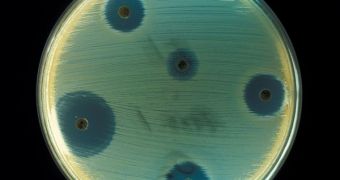A new surveillance technique, developed by researchers at the Marine Biological Laboratory (MBL), offered scientists studying the microorganisms that live in symbiosis with us a way to look at the changes bacteria in our gut undergo when we take antibiotics for several days. They've learned that the drugs not only disrupt the natural balance of the bacteria, but that they also modify presence ratios, in that previously dominant bacteria become secondary, while others set in as dominant.
This imbalance takes various amounts of time to disappear. While in some individuals it only takes a few hours or days for the bacteria to revert to their "factory settings," in other patients it may take as long as a few months. Thus far, the research team, comprised of scientists from the MBL and Stanford University, managed to identify some 5,700 genetically-distinct types of bacteria, or taxa.
In the current study, featuring a long-term survey of 3 individuals who were completely healthy, Mitchell Sogin and Susan Huse, both at MBL, working in collaboration with Standford researchers David Relman and Les Dethlefsen, found that, while most taxa returned to their previous "influence" within four weeks, some didn't fully recover after six months of observation.
"When you change the microbial population structure in the gut, you may affect how that population is keeping indigenous pathogens at manageable levels," argued Sogin. Under these circumstances, it would make sense that intestinal diseases could manifest themselves with higher incidence than they normally would.
The 100 trillion bacteria living in each and every one of us are indispensable to our existence, as they provide us with assistance in processing our food for energy, help our metabolisms and also regulate the response our immune system mounts against invaders. This complex ecosystem is currently being analyzed in an international study that the current research, published in the November 18th issue of PloS Biology, is part of.

 14 DAY TRIAL //
14 DAY TRIAL //